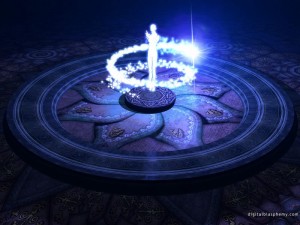 Recently I was accused of “not believing in anything” because I was skeptical of certain claimed medical advances. This is not an uncommon occurrence. I’m often called “robotic” by people who know me. I find this both interesting and frustrating, because IMHO what people are seeing is a self-defense mechanism. My actually problem is that I believe far too readily in far too much.
Recently I was accused of “not believing in anything” because I was skeptical of certain claimed medical advances. This is not an uncommon occurrence. I’m often called “robotic” by people who know me. I find this both interesting and frustrating, because IMHO what people are seeing is a self-defense mechanism. My actually problem is that I believe far too readily in far too much.
I’m quick to identify with groups and worship heroes (I would post a link to my encounter with Vernor Vinge if Facebook had any value at all as an archive. /fume ). I get passionate about abstract concepts quickly. I’m easily misled (I despise April Fools Day). I was a Randian for 9 months after reading Atlas Shrugged, simply due to having read Atlas Shrugged (yes, I’ve very embarrassed to admit that. Both parts of it.) I have frequent and sincere existential worries that I’m living in a simulation that has been designed around me specifically, and wonder about how to react to that knowledge. When something new and cool comes around I jump on it with a speed that’s simply stupid, and get FAR too excited about it. Most recently this happened with Soylent, which after learning about I was literally unable to stay still for the rest of the day and stayed on a happy-high for four days. I had to be brought down to earth by the Skeptics Guide to The Universe pointing out that this was nothing new and had been around as Ensure for decades. Crushing sadness. :(
So it seems I have a neuro architecture that is very strongly suited to believing things strongly with little or no evidence. I have what is sometimes called a Mystical Mindset. I recognized this as a problem, and I had to look for workarounds. I haven’t found a fully generalizable mind-hack, but I have found some useful techniques. As I mentioned, one of them is simply acknowledging that my brain is crazy and that statistically it’s far more likely that I’m crazy than that Thing X is true, so I should ignore it and calm down. This often works, but it also requires noticing that I’m being crazy in the first place.
A very handy heuristic is to accept what is settled science and take a very skeptical view towards outliers. Science is imperfect and slow, but it has a mechanism to separate truth from falsehood, and an internal error-checking procedure, so it keeps getting closer to reality. Faith has no such checks, so its correspondence to reality is largely coincidental (and often non-existent). If I haven’t heard of something before, my default position now is to be strongly suspicious until I’ve read about it in more detail. Not because I don’t believe anything, but precisely because my nature is to believe everything, and I have to control that. This is a basic self-defense mechanism, where what I’m protecting myself against is my own mental deficiencies. It is literally “self” defense in that I’m defending myself against my self.
I’m glad that these sorts of defenses are available nowadays. Had I not learned how to defend myself it’s entirely possible I would have ended up a priest or something.